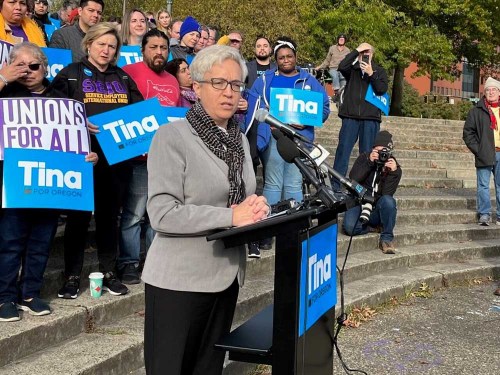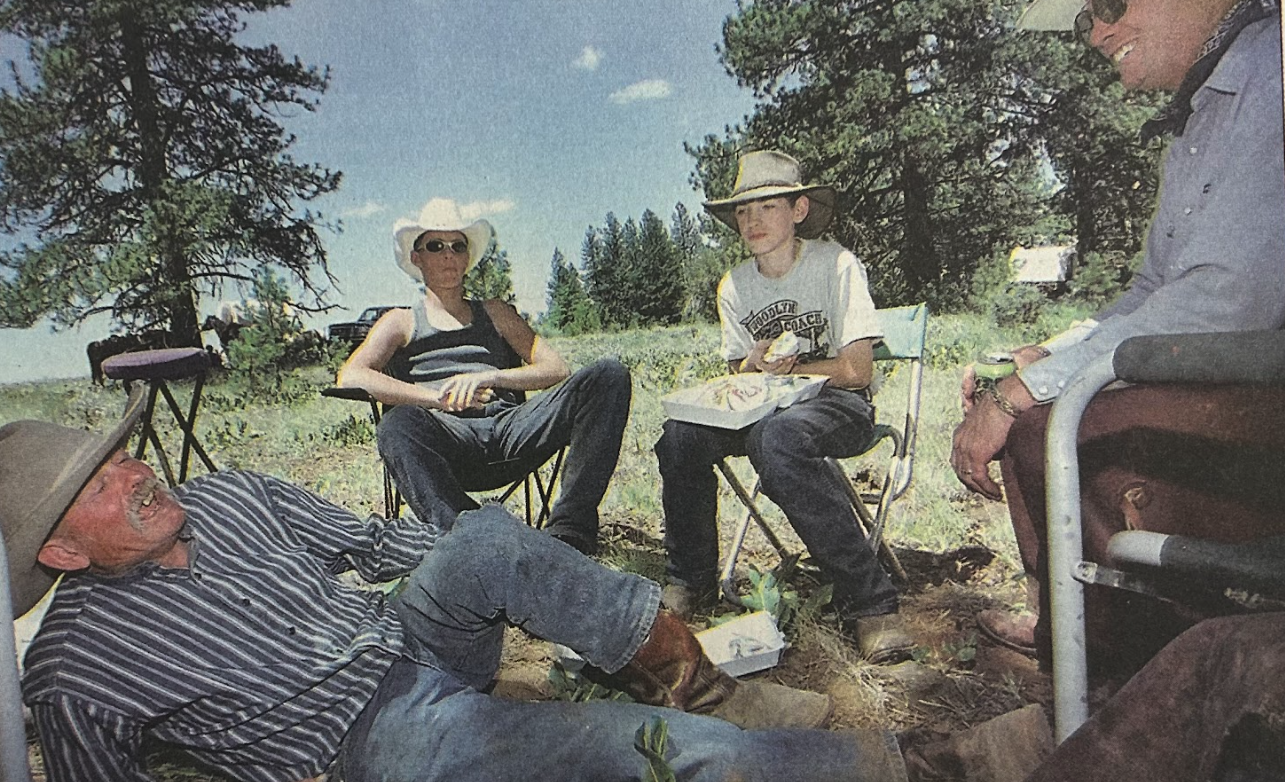Kotek: Budget will follow $130 million request for homeless
Published 12:58 pm Monday, January 30, 2023

- Tina Kotek speaks at a post-election event on Thursday, Nov. 10 in Portland.
Gov. Tina Kotek says her recommendations for the next two-year state budget will dovetail with her requests for $130 million now to help unhoused people and avert further homelessness.
Both await action by the Oregon Legislature, which ends its 2023 session by June 25.
She was scheduled by the legal deadline of Wednesday, Feb. 1, to present her recommended changes for the two-year budget, which starts July 1. As the incoming governor, Kotek can build on the budget work already done by state agencies by Jan. 9, when Gov. Kate Brown left office.
Kotek seeks action soon, although she did not offer a timetable, on her request for $130 million for various programs. She said the request follows through on executive orders she signed on Jan. 10, her first full day in office, on declaring a state of emergency for homelessness and setting up emergency coordination of efforts in five designated urban areas.
Other orders call on most state agencies to make it a priority to deal with homelessness and set an annual production target of 36,000 housing units. A new 25-member council, including her or her designee, will advise her how Oregon can reach that target – 80% greater than the annual average of production over the past five years.
Kotek has said more housing – particularly for people earning less than the area median income – is the ultimate solution to homelessness that has been growing over five years.
Oregon’s 2022 point-in-time count, which one of the orders concedes is “an underestimate,” has a total of 18,000 counted as homeless, 11,000 of them unsheltered. About 78% are within five urban areas she has designated in one of her orders; the other 4,000 are outside Portland, Salem, Eugene, Medford and Bend and nearby communities.
The 2023 point-in-time count is underway now.
Details of first request
Her statement about the $130 million request:
“I am urging the Legislature to take up this investment package as quickly as possible. Unsheltered Oregonians need relief now, and our local communities need the support to provide that relief. This is only the first step. Together, we can act with the urgency people across our state are demanding. Bold ideas, concrete solutions, disciplined follow-through. That’s how we can deliver results, this year, and in the years to follow.”
By categories, here are brief descriptions of her proposed spending, which she mentioned in her inaugural remarks Jan. 9. They add up to about $125 million:
• Eviction prevention: $33.6 million to help 8,750 households stay put through rental assistance and other services.
• Shelter beds and housing navigators: $23.8 million to add 600 low-barrier shelter beds and staff for navigation centers to connect people with housing and other services. While she was Oregon House speaker in 2021, Kotek helped steer state money for navigation centers outside the Portland metro area, among them Salem, Eugene, Bend, Medford, Roseburg and McMinnville.
• Re-housing services: $54.4 million to help at least 1,200 households obtain new housing through prepaid rental assistance, block leasing of at least 600 vacant homes, guarantees and incentives for landlords, and other actions.
• Tribal assistance: $5 million for state help for the nine federal recognized tribes in Oregon.
• Culturally responsive organizations: $5 million to help such groups ensure equitable outcomes under Kotek’s declared state of emergency, so that no community is disproportionately affected.
• Sanitation: $2 million for local sanitation efforts.
• Coordination: $1.8 million for the Department of Emergency Management and the Department of Housing and Community Services to coordinate their efforts under one of Kotek’s executive orders, which call for state emergency management officials to oversee efforts in four of five designated regions (Marion and Polk counties; Eugene/Springfield; Medford/Ashland, and Central Point). In the Portland metro area, Kotek or her designee will oversee the effort. No details on that arrangement have been forthcoming. Although Kotek has told reporters she has met with Portland Mayor Ted Wheeler and Jessica Vega Pederson, Multnomah County chair and chief executive.
Cities have own plan
Although Kotek did not disclose details of her 2023-25 budget recommendations, she appeared to be going in a different direction from that urged by Oregon mayors and other city officials, who support a per-capital aid plan.
Their plan, which they unveiled last fall and restated last week at a League of Oregon Cities gathering in Salem, calls for an annual allocation of $40 per resident – with a minimum of $50,000 per city – plus about $150 million for one-time construction costs associated with shelters. Based on a 2022 population count by Portland State University, the annual request for state aid amounts to $125 million in each of the next two years.
Mayor Teri Lenahan of North Plains says cities have demonstrated they are accountable for large-scale spending under two federal laws: the CARES Act of 2020, passed at the start of the coronavirus pandemic, and the American Rescue Plan Act of 2021.
“Our proposal is asking that funds be directly allocated to cities. Why? Because cities have a proven track record to receive, implement and report on dollars,” said Lenahan, who is president of the Oregon Mayors Association.
“Alternatives like competitive grants and county allocations heavily favor larger cities with staff to manage those applications and programs. That is not afforded to smaller cities in Oregon. If funds go only to cities with highly visible challenges, the root causes of homelessness are left untreated.”
But Kotek, in her remarks to the gathering of city officials later in the day, declined to commit to the plan. She said only that she would continue to discuss state aid with city officials.
“Homelessness in this state may look a little different in every community, but it is there. We have an issue with housing supply in every corner of our state. We need to take both of those issues on with the urgency they demand,” she said.
“My pledge to you is that we will be doing this together. I hope by the end of the legislative session, you will see resources that will help you do the things you need to do.”






